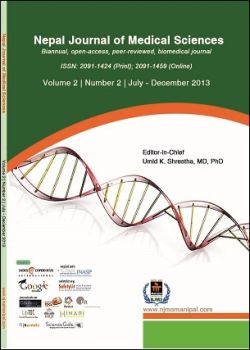Early intervention services to children with developmental delay in resource poor settings in India
DOI:
https://doi.org/10.3126/njms.v2i2.8966Keywords:
Community-Based Rehabilitation, developmental delay, early intervention, Early intervention toolAbstract
Background: Early intervention has been proven to be effective in facilitating development in children with developmental delay (DD). However, such service, subject of this study, is not available to DD children in most of India. Against the odds, therefore, one non-government organization (NGO) in the country, Ashagram Trust (AGT), decided to establish a service unit in a resource-poor geographical setting. This study aimed to examine the impact of early intervention provided to children with DD by Community Based Rehabilitation Workers (CBRWs) under supervision of professionals.
Methods: Data analysis of pre- and -post scores on an early intervention tool (EIT). A total of 67 children (male 38, female 29), ages 6 through 36 months, ranging in DD from borderline (IQ<80) to a high level of DD, received early intervention services provided by community-based rehabilitation workers (CBRWs) under the supervision of professionals. A total of 46 children who stayed in compliance were analyzed.
Results: A paired t-test was conducted. Overall results indicated significant improvement (pre-mean 22, sd – 3.9, post-mean 39, - 4.3, t-value – 6.40, p<0.0002, Pearson correlation 0.873, p<0.05) in children with DD in all four areas of development, motor, communication, cognitive and social.
Conclusion: The study demonstrated positive outcome of early intervention in areas of motor, communication, cognitive and social development of children with DD. Early intervention services may be successfully provided by CBRWs under the supervision of trained professionals in resource-poor tribal areas of India, using low cost locally prepared therapeutic materials.
Nepal Journal of Medical Sciences | Volume 02 | Number 02 | July-December 2013 | Page 149-155
Downloads
Downloads
Published
How to Cite
Issue
Section
License
Copyright © by Nepal Journal of Medical Sciences. The ideas and opinions expressed by authors of articles summarized, quoted, or published in full text in this Journal represents only opinions of authors and do not necessarily reflect the official policy of Nepal Journal of Medical Sciences or the institute with which the author(s) is (are) affiliated, unless so specified.




